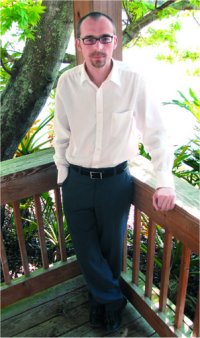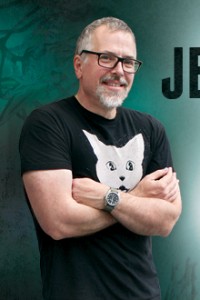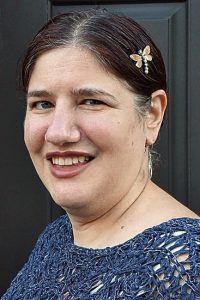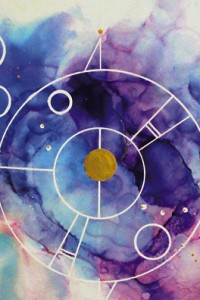Jedediah Berry: A Stranger Road
 Jedediah Berry was born in Randolph, Vermont, and grew up in Catskill, New York. He attended Bard College, where he worked on the literary magazine housed there, Conjunctions (including the New Wave Fabulists issue). He continued to work on the magazine after he moved to New York City following graduation, and also got a job at the PEN American Center, where he was assistant editor of PEN America: A Journal for Writers and Readers. He attended graduate school at the University of Massachusetts Amherst, writing first novel The Manual of Detection as his Master’s thesis, and graduating in 2007. While in grad school he began volunteering at Gavin Grant and Kelly Link’s Small Beer Press, where he now works as an editor.
Jedediah Berry was born in Randolph, Vermont, and grew up in Catskill, New York. He attended Bard College, where he worked on the literary magazine housed there, Conjunctions (including the New Wave Fabulists issue). He continued to work on the magazine after he moved to New York City following graduation, and also got a job at the PEN American Center, where he was assistant editor of PEN America: A Journal for Writers and Readers. He attended graduate school at the University of Massachusetts Amherst, writing first novel The Manual of Detection as his Master’s thesis, and graduating in 2007. While in grad school he began volunteering at Gavin Grant and Kelly Link’s Small Beer Press, where he now works as an editor.
Berry has published short stories in various literary magazines and in fantasy anthologies, notably ‘‘To Measure the Earth’’ (2006) and ‘‘The Other Labyrinth’’ (2007). The Manual of Detection (2009) combines elements of detective stories, fantasy, surrealism, and steampunk, and won the Dashiell Hammett Prize and the William L. Crawford Award for best first fantasy.
 “The Manual of Detection is about a file clerk named Charles Unwin. He works for a large mystery-solving organization called The Agency, and his responsibility for decades has been to file the cases of Travis T. Sivart (a palindrome name I’d been hanging onto for years). Sivart goes missing, and Unwin is promoted into his place. It’s the last thing that Unwin wants, but he gets caught up in this conspiracy involving dream detectives and sleepwalkers and an evil magician who’s part of a former traveling carnival that’s been in the city for years.
“The Manual of Detection is about a file clerk named Charles Unwin. He works for a large mystery-solving organization called The Agency, and his responsibility for decades has been to file the cases of Travis T. Sivart (a palindrome name I’d been hanging onto for years). Sivart goes missing, and Unwin is promoted into his place. It’s the last thing that Unwin wants, but he gets caught up in this conspiracy involving dream detectives and sleepwalkers and an evil magician who’s part of a former traveling carnival that’s been in the city for years.
“When I was watching reactions to this book, some people would say, ‘It’s set in some strange version of 1940s New York,’ and I thought, ‘Yeah, that’s about right.’ Then other people would say, ‘It’s set in some bizarre London.’ It’s no actual city, of course, but maybe London came to mind for some because I used something of the voice of Victorian fiction to help portray this character who is overly fastidious and punctual: a kind of White Rabbit. I needed a formality in the language to pull that off, drawing on writers like Dickens and Wilkie Collins.”
…
“Dreams give so many tools to the writer to play with: images and archetypes. It’s just like a playground, so I couldn’t resist that. It can be a trap too. So often, a dream can be used as a shortcut to spill the psychological freight that a character is carrying, it feels like dangerous territory. But I try to elevate dreams to the level of the everyday in this book, and have slippage occur between the waking world and the sleeping. Hopefully, it’s more like these two not-completely-distinct halves.”
…
“As a kid, I read a lot of comic books and a lot of fantasy. My mom was a reader and my grandmother was a reader, and they always encouraged me. One of my earliest memories is seeing, on my mom’s bookshelf, these odd paperbacks with weird geometric designs on the spines. They were thick and mysterious looking, and had strange landscapes on the covers. I remember thinking: when I learn how to read, I’m going to read those books. They were The Lord of the Rings, her old paperback copies. And I remember reading Beagle’s The Last Unicorn for the first time. Early on, those fantasy works were very important to me.
“Later my reading became increasingly eclectic. I fell in love with Kafka and with Beckett, with Poe and with Lewis Carroll. I had a dear friend in junior high and high school who read a lot more genre works than I did and was really good at giving me these Reader’s Digest Condensed versions of them, so I always knew what was going on in Xanth or Pern that month!”
…
“I’ve only written one book, and it took me five or six years to write it. What I imagine happening is that I will probably shift around in terms of the time it takes to complete a novel. I have one book in mind which I know is going to require vast amounts of historical research, and I think a lot of care in the crafting of the language. It’s the book I keep not writing – I keep writing something else to put that one off. There are some books I want to write which I think will just take a year or two, but then some which will take a much longer time. I’m trying to figure out when it’s OK to disappear for a while.
“Ten years from now, I think I just want to have been in a number of different places. I’ve spent most of my life in the northeast corner of the United States, and I think I need to set out and explore a bit more. Everything else I consider to be wide-open territory.
“I prefer to look at fiction as fiction, no matter how it gets categorized, but those questions of fantasy and science fiction – of genre in general – are useful when used as a lens through which to examine particular threads that go back very far. In the introduction to one of his books, Calvino wrote that the fantastic is ‘the revolt of the Unconscious.’ I like the idea that there’s something subversive about it. There’s an opportunity to have what is usually kept under wraps explode onto the surface. That’s what I feel I do, and maybe to some extent that’s what I felt I was doing while writing this kind of fiction in an MFA program: that there was something delightful in putting in more trench coats, or in having that gun go off, or in having detectives shining their flashlights into people’s dreams. But I can’t help it either. I’ve tried sometimes to write fairly realistic stories without indulging in the fantastic, but I inevitably indulge. I need to break something in order to make it interesting to myself.”




 Excerpts from the interview:
Excerpts from the interview:




Pingback:Tweets that mention Locus Online Perspectives » Jedediah Berry: A Stranger Road -- Topsy.com